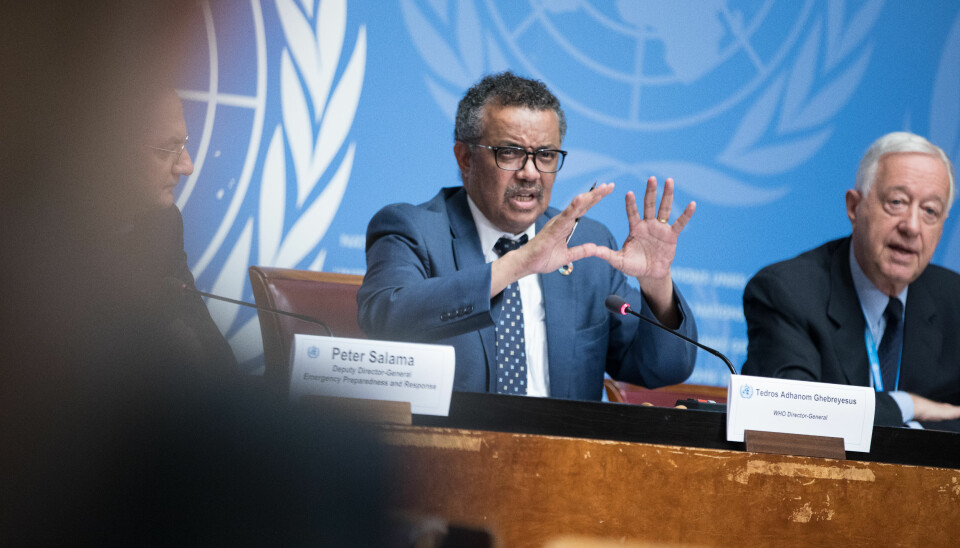For å lese pluss-artikler må du være abonnent
Et abonnement gir tilgang til alt innhold og vi har følgende tilbud
NYHET

At a press conference on the 9th of February the leader of WHO’s investigative team Dr. Peter Ben Embarek, who has been tasked to search for the origins of the SARS-CoV-2 in Wuhan, surprisingly announced that the team will no longer consider the possibility that the current pandemic started as a laboratory accident. Thereby contradicting earlier statements made by the WHO that the hypothesis is to be considered part of the investigation.
“The findings suggest that the laboratory incident hypothesis is extremely unlikely to explain introduction of the virus into the human population, and therefore is not a hypothesis that implies to suggest future studies into our work, to support our future work, into the understanding of the origin of the virus”, Dr. Embarek said.
The swift conclusion by the WHO team to discard the lab hypothesis is considered premature by many. When asked about the statements by Dr. Embarek, Edward Price from the US State Department, made it clear that they are still awaiting the full report from the WHO and called for increased transparency from China.
Interesting. Biden admin. does not endorse WHO conclusion that it’s “extremely unlikely” #Covid19 leaked from Chinese lab.
— Joyce Karam (@Joyce_Karam) February 9, 2021
Stresses “need for full transparency + access from China and the WHO... to all information regarding the earliest days of pandemic”pic.twitter.com/vQlYUTdHfJ
The investigation in Wuhan had begun only 14 days earlier, when the investigative team had finished their travel quarantine, after entering China on the 14th of January following many months of delay caused by wrangling and rebuffs.
Some context to the decision has however been given by individual team members.
In an interview given to China Global Television Network, Dr. Peter Daszak, a long standing collaboration partner of the Wuhan Institute of Virology at the heart of the dispute, and a member of the WHO investigative team, stated that the team voted unanimously to discard the laboratory hypothesis after having seen the data provided by their Chinese peers.
Another member of the WHO team, Dominic Dwyer, a medical virologist at New South Wales Health Pathology in Sydney, told Nature that the team didn’t see anything during its visits to suggest a lab accident, but also suggested that team might not have been shown the whole picture: “Now, whether we were shown everything? You can never know. The group wasn’t designed to go and do a forensic examination of lab practice”, Dwyer stated.
The leader of the WHO team, Dr. Peter Ben Embarek, has also concurred with the statement from Dwyer stating that the WHO team is not equipped to investigate the possibility of a lab leak. “If our studies point to a possible lab accident, then other international mechanisms would be involved to document such an event. It would take time and additional types of expertise”, he is quoted saying in the Wall Street Journal.
And adding further complexity to the issue, WHO Director-General Tedros Adhanom Ghebreyesus corrected his own investigative team in a statement given to member nations yesterday: “Some questions have been raised as to whether some hypotheses have been discarded. I want to clarify that all hypotheses remain open and require further study”, Adhanom Ghebreyesus stated.
More than a year has passed since the epidemic was discovered in Wuhan, and a lot of relevant raw data to understand how the pandemic began has either been destroyed or made inaccessible by other means to the WHO investigative team.
Scientists at the Wuhan Institute of Virology have already stated that the sample containing the most closely related virus sequence to the SARS-CoV-2 virus, called RaTG13 is no longer accessible due to the sample being «used up» during sequencing of the virus conducted at the institute in 2018.
The WHO team has asked for access to samples of wastewater and blood samples collected in Hubei Province in autumn 2019 to look for early evidence of the virus circulating prior to december 2019, but has been rebuffed. Chinese authorities claimed they don't have the necessary permissions to test blood samples, many of which are held in blood banks, and that all wastewater samples have been destroyed.
Alina Chan is a postdoctoral fellow at the Broad Institute of MIT and Harvard, and an outspoken proponent of investigating the lab origin hypothesis. She is worried that the WHO team has been given “the short end of the stick by Chinese authorities”.
“I find inconceivable that the Chinese government would be unable to obtain permission from its citizens to test early blood samples for traces of Covid-19”, she tells Minerva, implying that Chinese authorities are preventing access to important information for the WHO team.
Asked about whether she has confidence in the ongoing investigation Chan remains sceptical:
“There are issues on how this team has been assembled. Two members have already stated that they don't consider the team to have the relevant expertise to investigate a lab accident as the potential origins of the virus, and one member has reasonably perceived conflicts of interest as a long standing collaboration partner of the Wuhan Institute of Virology.”
However she is still awaiting the full report from the team before she makes up her mind: “I understand that they are under extreme political pressure, and they are repeating the message that we should wait for the full report”.
“We might have to wait until the team returns from China to see if any of the team members will change their mind”, Chan adds.